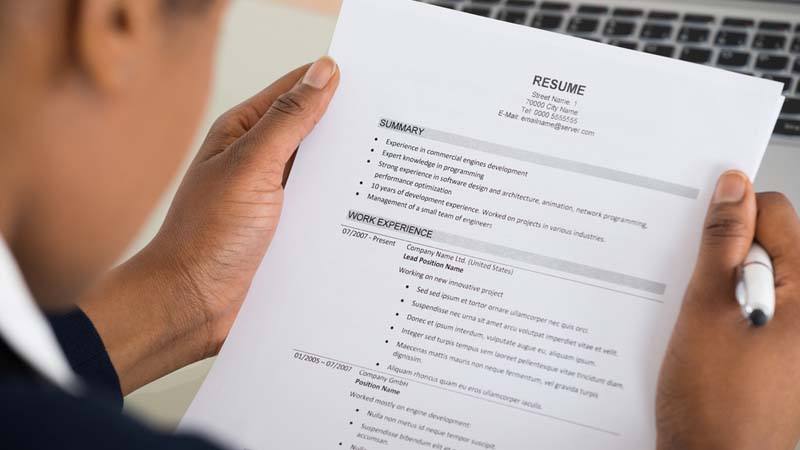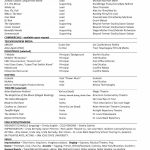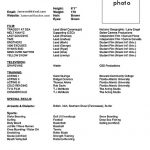The Perfect Actors Resume 2023
Feb 01, 2023Your Acting Resume is your First Impression
Your acting resume is the single most important tool an actor can use to get acting work. Your resume is going to be your ticket to success, your passport as an actor towards new work. Now whether you are starting with an actors resume for beginners or are more experienced, I am going to give you tips to make yours...sing!
Beautifully.
YOUR GOAL
You need an actors resume that will stand out from the rest.
Your acting resume is often the first thing a casting director, talent agent, a director, or producer gets to see what you look like (Headshot) and learn who you are and discover more about your past work history, capabilities and skills. It's super important.
A Snapshot - A One Page Summary
Casting Directors
How To Format Your Acting Resume in 2023
Your actor resume should be "standard format". Most actors put together a resume of a certain size and so should you - It's an industry "Norm". If yours is different you may jeopardise your chances before a casting director or talent agent has even read through it. Even tho this is not a strict rule, try to use this as a guide:
- One page containing your details 8" x 10"
- In Europe that is 21.5cms x 25.5cms
- One headshot of the same size, or slightly smaller
- You can start building yours right here
Click on the pic below for FREE self taping training.
START working on your acting resume by:
...listing your name and professional or union affiliations (leave it blank if this does not apply to you) to the top. Then add a detailed description of yourself which may include your height, weight, hair colour, eye colour.
Include your singing ability or vocal range, too. If you are not suitable for this role, you may be remembered for an alternative role so these parts are crucial. For a person that does not sing, you may add either 'alto' or 'baritone', which explains that you simply are not a singer.
Remember: you need to add your contact information. You'll want to list all telephone and mobile numbers that you can be contacted on, with voicemail if possible.
Work History
Then, add in your work history grouped together in categories by type. Start with roles you had in film, followed by television, then theatrical or stage roles that you've taken part in. List the name of the production first, followed by the role, and then either the name of the production company or the director.
Directly following your film, TV, and theatre credits is the commercial section. This area is where you would list any credits you may have for working on a TV commercial. However, in most cases you won't list the commercials you've been in.
Because of conflicts between advertisers, it's better not to list commercial credits just put something like, "Adverts available on request." This tells the casting directors that you've appeared in commercials and if they want more info they should contact you directly and discuss the ads with you.Cool huh?
Training
After you've listed your work history, add any training and acting education you have had or are currently involved in - drama schools, colleges, university courses. List things like schools, classes, and popular acting coaches (I wonder who you could mention ha ha x N)
Including this lets the casting directors know you've taken time to study your craft and take it seriously. If you don't have many professional acting credits it will be looked upon positively, giving you a better chance of success and more chance of being remembered for future parts.
Good Quality Paper
Make the final print on a good grade of paper using a high quality printer, if you don't have one ask a friend to print it out for you. Keep a copy yourself and have it copied as many times as you need at a printing store as the copies will be just as good as the original. Looks great and last for years!
Your Headshot
Your headshot is just as important as your resume and should be the best you can afford. Make sure it's professional and follows industry norms - ensuring the casting director or talent agent is seeing a high quality image along with your professional resume.
Attach your headshot to the back of your actors resume I'd staple it - keeps them together :-)
Your acting resume should be lean, clean, crisp, attractive to look at and easy to read from top to bottom and free of any typos. Add your personal description and all contact information so that you can be notified when necessary.
It is a good idea to think of your acting resume as a first audition. If it doesn't impress, then you are likely to be unsuccessful in getting quality acting roles or called in for auditions. With this in mind, it is vital that you get the resume right and looking good.
As a final note, it is a good idea to get your resume seen by as many casting professionals as possible and today, more casting directors are going green and going digital by utilizing online casting services.

Acting CV 101: Beginner Acting Resume Example For Those With No Experience - from Acting in London.co.uk
These guys offer a really good free guide for beginner actors - check it out.
Let’s begin with first talking about what an acting CV or acting resume is. These two terms are interchangeable. In the UK, you’ll hear the word “acting CV” used more often, while in the US, everybody refers to it as “acting resume.”
1. What is an acting resume?
If you have ever tried to apply for a job, any kind of job, then you probably know what curriculum vitae is (CV). Acting CV/résumé is the exact same thing, only tailored to applying specifically for jobs in film, television, stage and commercials as an actor.
Your acting CV is the first thing you’re going to contribute to your acting startup kit. It’s easy to put together and it costs nothing. Whether you have something to put on it or you don’t is a whole different story, but remember: everybody starts somewhere.
An actor resume is the second most important thing acting agents, casting directors and other industry professionals will look at. The first thing they will care about is your actor headshots.
I have whole page about actor headshots if you like, go here x Nick
If you pass the first stage of “does the actor look the part” based on your headshot, which is something you can do nothing about (aside from getting truly good headshots), you then must do your best to strengthen your chances with a professional acting resume.
While each actor’s CV looks a little different and none of them are identically structured, there is a specific acting resume template that everybody follows. You can see a beginner acting resume example below.
2. What to put on your acting CV?
Here’s what industry people are looking to find on your acting resume:
- How experienced you are;
- What kind of acting training you’ve had;
- Your measurements and description;
- Your contact information;
- Any specific/unique skills you have.
When you’re just starting out in the business, your acting CV will look a little on the “white” side. Try and do your best to fill it with anything that’s relevant. Think of all the skills you have, any small productions you’ve been involved with.
At this point you can even put school plays and small acting workshops.
You might see your acting resume as not having enough “meat,” and honestly, it probably it doesn’t. However, sometimes, one of those things will catch an agent’s or casting director’s eye, and you’ll get called in for an audition.
That one thing could be anything, from your height to your ability to balance a pencil on your nose. Other times, all they want to see is that you’ve had any experience at all, be it a school play or a student film.
3. Sample acting resume example/template
The way your acting CV is actually structured depends on your own preferences. For example, if you Google “acting CV” and go to “Images”, you’ll see that none of them are exactly the same, but they follow a certain pattern.
Here’s the order of things you can use on your resume:
- Your professional (stage) name
- Union affiliations and agency (if any)
- Contact details, personal information and measurements
- Credits, work experience
- Training
- Any specific skills
Always keep numbers 1-3 at the top in this order, and you can switch 4-6 around (but the way it’s listed above is usually the best).
On the right side, you can use the US industry standard acting resume example. This type of acting resume template is the one that I recommend because it’s less complicated and easy for agents and CDs to scan.
Below is the UK’s market acting CV example structure, where they use a small headshot in the corner. Frankly, I don’t see the point of including a headshot in the corner since you’re sending your full-sized headshot alongside your acting CV anyway (they should be stapled together).
Ultimately, they both get the job done in the UK industry. In the US, only the US type of acting resume is acceptable; the UK version will appear odd to agents and CDs.
4. How to make an acting resume with no experience
In terms of creating your very first acting CV when you have no experience, there really is no shortcut. You’ll just have to get experience – any kind.
Before you even start working on your actor resume, see if you can join any community theatres, drama clubs, apply to local student film productions, get into any type of acting workshops and acting classes – anything will do.
More importantly, see if you can produce a short film or a play yourself. Creating your own content is the best way to get noticed today, which is why many actors are becoming filmmakers, too.
To start with your acting resume with no experience, simply put anything you can remember: school plays, films you and your friends put together, etc. The same applies to your training.
What if you have nothing at all? If that’s the case, then you may want to hold off from putting together an acting resume. How do you even know if acting is what you want to do if you’ve never done it?
If that’s you, then start looking for acting opportunities that are accessible to amateur actors who may not even consider this as their career choice. The ones listed above are your best bet.
5. Things to keep in mind
 First, remember that your acting resume can only be of a single A4 page. It should also fit nicely with your 8×10 headshot so that you can staple them both together.
First, remember that your acting resume can only be of a single A4 page. It should also fit nicely with your 8×10 headshot so that you can staple them both together.
As an actor, you never leave your home without a batch of acting resumes in your backpack or purse. You never know who you might run into. Once you get the opportunity to hand them over, you will also need your headshot, which is why you keep those two stapled together.
Once you’re a more experienced actor, drop those credits with less value to keep everything packed on just one page.
Another thing to keep in mind is to avoid putting your date of birth and/or age on your acting CV.
There is absolutely no need for anybody to know how old you actually are before they cast you. In casting people’s eyes, you are as old as you look. More on the reason behind this in a separate article.
As long as you’re legal 18, if casting directors ever ask you about your age, your first response should be: “how old do I look?” Whatever they say is how old you are. They have no business knowing your actual age if you’re an adult.
Advice from Chicago
As actors, our resumes and our head-shots are essential in our business. If you’ve never had to put together an acting resume before, it can be a bit confusing. Your resume should be helpful and informative, so what kind of information should you include on your resume? What should it look like? What’s a good format?
"Nick says, very clear examples here on a very clear site"
Here are the basics:
- Your acting resume is always on one sheet of paper and it needs to fit on the back of your 8×10 head-shot. You might have to trim the edges. Staple your acting resume to the back of your head-shot (in the corners). Do not use a paperclip.
- It needs to be easy to read so don’t choose a weird, tiny, font.
- You don’t have to put every role you’ve ever played on your acting resume. Unless you’re in high school or just graduated high school, no one needs to know that you were in Godspell in 10th grade.
- You really should stick to black lettering on your resume.
- Don’t lie on your resume. It’s a small community and eventually, you’ll be found out. Just don’t do it.
- Do not put “extra” work on your resume.
The Four Things You NEED For An Acting Resume
HEADER
1. Name
2. Contact information (this will be your agent’s info, if you have one)
a. Phone number
b. Email
3. Eye Color (optional)
4. Height (optional)
5. Weight (optional)
CREDITS
(List them first in order of importance, then from newest to oldest)
(lead with the “section” that you’re submitting for; if you’re auditioning for a play then lead with theatre)
1. Theatre
2. Film/TV
3. Commercials
TRAINING
1. School
2. Classes
3. Teachers
SPECIAL SKILLS
1. Sports – Indicate level of expertise by noting # of years/ or level of competition
2. Physical training (yoga, stage combat, etc.)
3. Dialects – Only list dialects that you can do well, on the spot
4. Musical Instruments-Indicate level of expertise by noting # of years played
5. Foreign Languages-Indicate level of expertise by adding “fluent” or “conversational
The last line of your special skills section is an opportunity for you to be funny/entertaining/show your personality. If you can juggle soup cans, that’s a good place to put that info. Maybe you were once a ventriloquist or you play the mouth harp. This is the place where you can add a bit of personal flair.
Below are 2 examples of what the formatting of your resume should like.
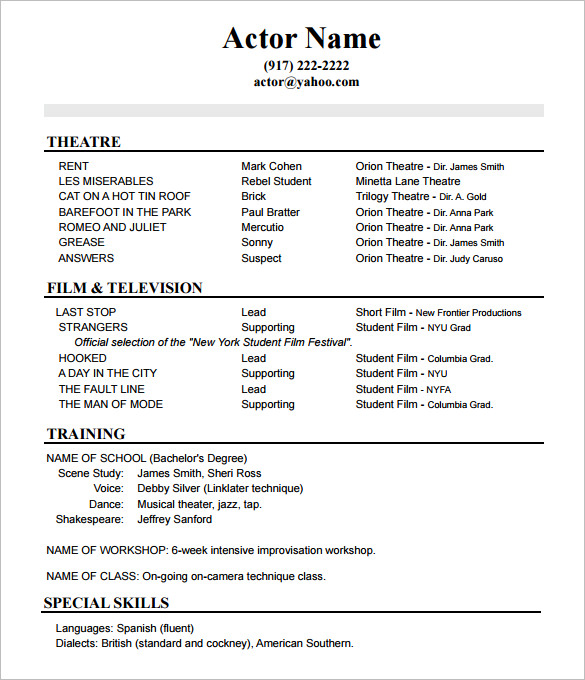
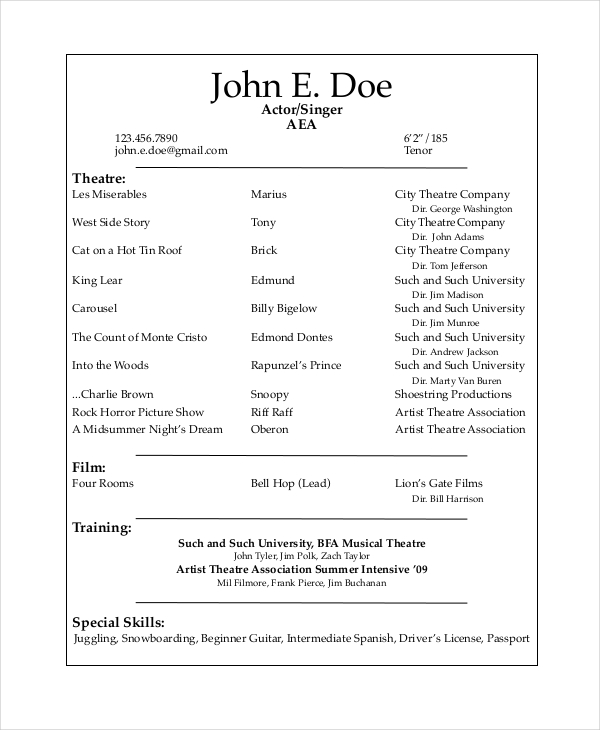
If you have any questions about your resume, need some advice or just an extra set of eyes, you can always reach out to us. ASC is always happy to help!
Here's the ASC main site - check it out :-) x Nick
Big Actor Resume Mistakes To Avoid
5 Characteristics of a Good Actor Resume
No matter which template you choose, the ingredients that go into an outstanding actor resume remain the same.
Keep these features in mind when choosing which template you'll use to make your acting resume:
1. Visually Attractive
A good acting resume must visually grab the attention of casting directors, directors, and producers. Look for a resume template design that’s visually pleasing, enticing, and easy to read. For fun and if it's appropriate, make the design match the role. For example, use an acting resume template that matches the time period of the play, movie, or program you want to perform in.
2. Fits On One Page
Resumes for traditional jobs can be as long as two pages. However, the norm for actors is different. Actor resumes for theater and performing arts jobs should only be one page long (see item 3 below). You can find resume templates for Microsoft Word that are specifically one-pagers, which you can then easily adapt for your actor resume.
3. Includes a Headshot
The prevailing advice for actors is to attach your resume to the back of your headshot.
Many of the professional resume templates in and GraphicRiver include headshots, either as a full page or a thumbnail.
If the resume template has a headshot as a separate, full page, then you can print your headshot and performance resume, back-to-back, from the same file. This makes for a more professional-looking resume + headshot document than the typical one that’s glued or taped together.

A thumbnail photo that matches the full headshot you submit makes your resume more memorable.
And, as you'll see in this tutorial, it's easy to switch the headshot in your resume, so it's appropriate to the role you’re applying for.
4. Truthful & Accurate
As much as you want to impress the decision-makers behind the production you’re vying for, you never, ever want to lie or “embellish” on your performing arts resume. Stick to the facts and make sure you can provide evidence for any claims you make. For example, if you say your performance was critically acclaimed, then be ready to show clippings or screenshots of the glowing reviews.
5. Customized to the Role
If you’ve had a lot of performances, you may not be able to fit everything on one page. This is when it becomes necessary for you to customize your performance resume to the role you want. Include only the experiences, education, and special skills that are relevant to the role.
Stay connected with news and updates!
Join our mailing list to receive the latest news and updates from Nick.
Don't worry, your information will not be shared.
We hate SPAM. We will never sell your information, for any reason.

